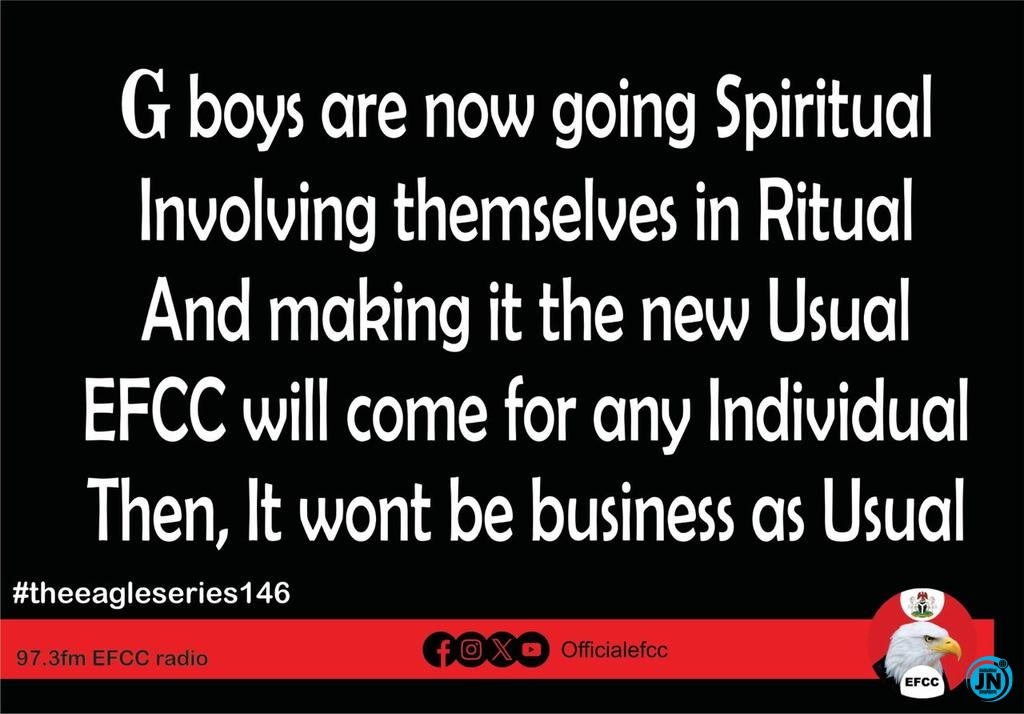The Economic and Financial Crimes Commission (EFCC) has raised a serious alarm over what it describes as a “disturbing and worrisome new trend” among internet fraudsters in Nigeria, popularly known as “Yahoo Boys.” According to the anti-graft agency, these cybercriminals are now allegedly resorting to spiritual and ritual practices to enhance their fraudulent activities and acquire illicit wealth faster than before.
In a detailed statement released via its official X (formerly Twitter) handle on Friday, October 17, the EFCC disclosed that intelligence gathered from recent investigations indicates that several suspects under interrogation confessed to engaging in various forms of rituals, sacrifices, and spiritual consultations in their pursuit of “successful” cyber scams. The Commission identified these individuals as “G Boys,” a term that reportedly represents a new breed of internet fraudsters who mix online manipulation with occult practices.
The EFCC expressed deep concern that what began as a digital crime carried out through emails, social media, and hacking has now taken a dangerous and superstitious turn. The statement reads in part: “The evolution of cybercrime from digital deception to spiritual manipulation marks a troubling phase. These fraudsters no longer rely on coding or digital tricks alone; many are now seeking spiritual power and protection to carry out their illegal activities.”
The Commission described this development as both morally and socially alarming, noting that it reflects a growing desperation among young Nigerians seeking wealth through illegitimate means. The EFCC further stated that this disturbing combination of internet fraud and ritual practices poses a serious threat to the moral and spiritual fabric of society, as well as to national security.
EFCC Vows to Intensify Crackdown on Cybercriminals
In response to the new trend, the EFCC vowed to intensify its operations, broaden its intelligence network, and launch more targeted raids on hotspots known for harboring cybercriminals. The agency emphasized that it has already begun tracking cases involving suspects who allegedly use charms, voodoo, and other ritualistic items as part of their fraudulent schemes.
The Commission’s statement urged the Nigerian public—particularly parents and guardians—to pay closer attention to the sudden lifestyle changes of their children or wards. It warned that the quest for quick wealth often leads many young people into dangerous activities that can destroy their lives and reputations permanently. “The EFCC will not fold its arms and watch this menace grow,” the agency stressed. “We are fully aware of the developments and will ensure that anyone found culpable faces the full wrath of the law.”
Reaffirming its determination to combat all forms of financial and internet crimes, the EFCC declared that no form of ritual protection or spiritual backing will shield offenders from justice. The statement also cautioned spiritualists, herbalists, and self-acclaimed prophets who offer services to cybercriminals, warning that aiding and abetting crime—spiritually or otherwise—is a punishable offense under Nigerian law.
In its post, the EFCC wrote: “G Boys are now going spiritual, involving themselves in ritual and making it the new usual. EFCC will come for any individual; then, it won’t be business as usual.” This post has since sparked widespread reactions among Nigerians online, with many expressing shock and disappointment at the extent to which some youths are willing to go for material gain.

The EFCC reiterated its unwavering commitment to safeguarding the integrity of Nigeria’s financial system, warning that cybercrime remains a major national concern that undermines global confidence in Nigerian digital transactions and tarnishes the country’s image abroad.
Furthermore, the Commission assured Nigerians that its operatives are already working around the clock to dismantle cybercrime networks across major cities, including Lagos, Abuja, Benin, and Port Harcourt. It noted that recent arrests have yielded valuable intelligence about the increasing spiritual dimensions of Yahoo-related activities, which will help shape future investigations.
The EFCC concluded by reaffirming that no matter how advanced or spiritually fortified the fraudsters believe they are, justice will prevail. “Crime has no hiding place,” the agency declared. “The EFCC will continue to pursue every offender until the nation is free from the grip of cybercrime and ritual-driven fraud.”
It also called on community leaders, religious institutions, and educators to join hands in promoting moral values and discouraging the dangerous glamorization of illicit wealth that is fast eroding societal values among Nigerian youth.